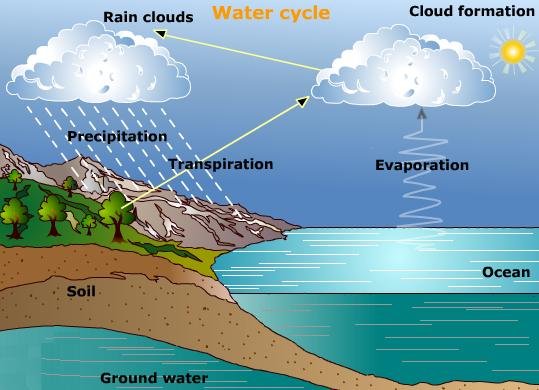WHY CAN WATER EVAPORATE WITHOUT BOILING?

Let's start by remembering what the temperature is.
As I have said before, what we interpret as the temperature of a substance is no more than the reflection of how fast the molecules it contains move. That is why the minimum possible temperature, -273.15 ° C, corresponds to the state in which the molecules that make up an object are completely still. From that point, the faster the molecules of a substance move, the more its temperature will seem to be.
On the other hand, as I also said when explaining why most of the interior of the earth is not in the liquid state, the magnitude of the motion of the molecules also determines whether a substance will be in the form of a solid, liquid or gas. When a solid warms enough, its molecules end up vibrating so fast that the rigid and orderly structure in which they are organized collapses, the molecules scatter everywhere and their movement prevents them from rejoining. At that time, it is said that the solid has become a liquid.
If we keep raising the thermostat, there will come a point where the molecules on the surface of the liquid will move as fast as they will be fired into the atmosphere ... And that is basically what happens when a substance becomes a gas.
But this explanation lacks a nuance: the temperature of an object is not only the result of the speed at which its molecules move, but of its average speed. And this is very important because all the molecules contained in a substance (in the form of liquid or gas) move at different speeds
Basically, it means that most of the molecules contained in a liquid move at a similar velocity, but there will always be a fraction of them that moves fast enough to escape the liquid or, what is the same, have the Temperature to evaporate.
And that is why liquids evaporate even though they are below their boiling point: although, as a whole, it seems that the liquid is not hot enough to become a gas, some of its molecules are escaping into the atmosphere All the while because its speed (temperature) is much greater than the others.
A "cold" liquid contains a certain number of molecules that have the necessary temperature to evaporate. But, then, should not the evaporation process stop when all of them have escaped into the atmosphere? Why does the liquid continue to evaporate when these molecules have left?
Although some of the material that makes it is evaporating, the velocity profile of the molecules that make up a liquid is maintained because all are constantly colliding with their neighboring directions. For example, some collide head-on and lose speed or others that move slower receive the momentum of a faster molecule. As a result, even if all the particles that make up a system start moving at exactly the same speed, interactions between them would sooner or later end up adopting the velocity profile
That is, while the water evaporates and the faster molecules are leaving the liquid, collisions between those that remain inside accelerate other molecules to the same speed that, in turn, also end up escaping. This loop repeats over and over again until all the molecules have come out of the liquid and therefore the mass of water has completely dried.
Total, that the water that gives form to the clouds leaves the ocean by this same mechanism: in the surface of the water there are molecules faster that they leave continuously to the atmosphere and they rise in the air. But this does not mean that the oceans are going to dry, of course, because all the water ends up coming back to them through the rains.
Why does a water molecule float in the air when it goes into the atmosphere, but does not when it is in the liquid? Should not your density be the same regardless of the way you are?
You have to keep in mind that, in the liquid state, there is very little space between the water molecules because there is a strong electrostatic attraction between them. As a result, you can put many molecules in a certain volume, which means that it will contain a larger mass and, therefore, that its density will be higher. On the other hand, the molecules of a gas are very separated because there is no force that one them and, therefore, the constant collisions between them keep them away. In this case, a smaller number of gas molecules fit in the same volume, which translates into a lower density. That is why the vapor has a density less than liquid water and can float in the air.
And that's why the clouds float, right?
Well, technically the clouds are not composed of pure and hard water vapor, but by tiny drops of water that condense when the vapor cools. That is, the water that forms the clouds is in a liquid state and its density is greater than that of the air but, in this case, water droplets (or ice crystals if the temperature drops sufficiently, as we saw here) Remain in suspension simply because they are so small that they are swept away by the movement of the air.
Source: https://van.physics.illinois.edu/qa/listing.php?id=1474 - https://stab-iitb.org/newton-mirror/askasci/chem03/chem03950.htm - https://water.usgs.gov/edu/watercyclecondensation.html

This post seems to be google-like-translated from this original article in Spanish. Google-like translations should be avoided, as this is not what most users are looking for on Steemit. On top of that, this may be a plagiarism issue.
What I recommend is that you write a couple of paragraphs of your own and then provide a link to the source. This may attract more rewards, in my opinion. Thanks in advance for your consideration!
Good explanation. :)
A lot of people really don't take enough chemistry to learn about the layer of gaseous molecules above a liquid.
Well put